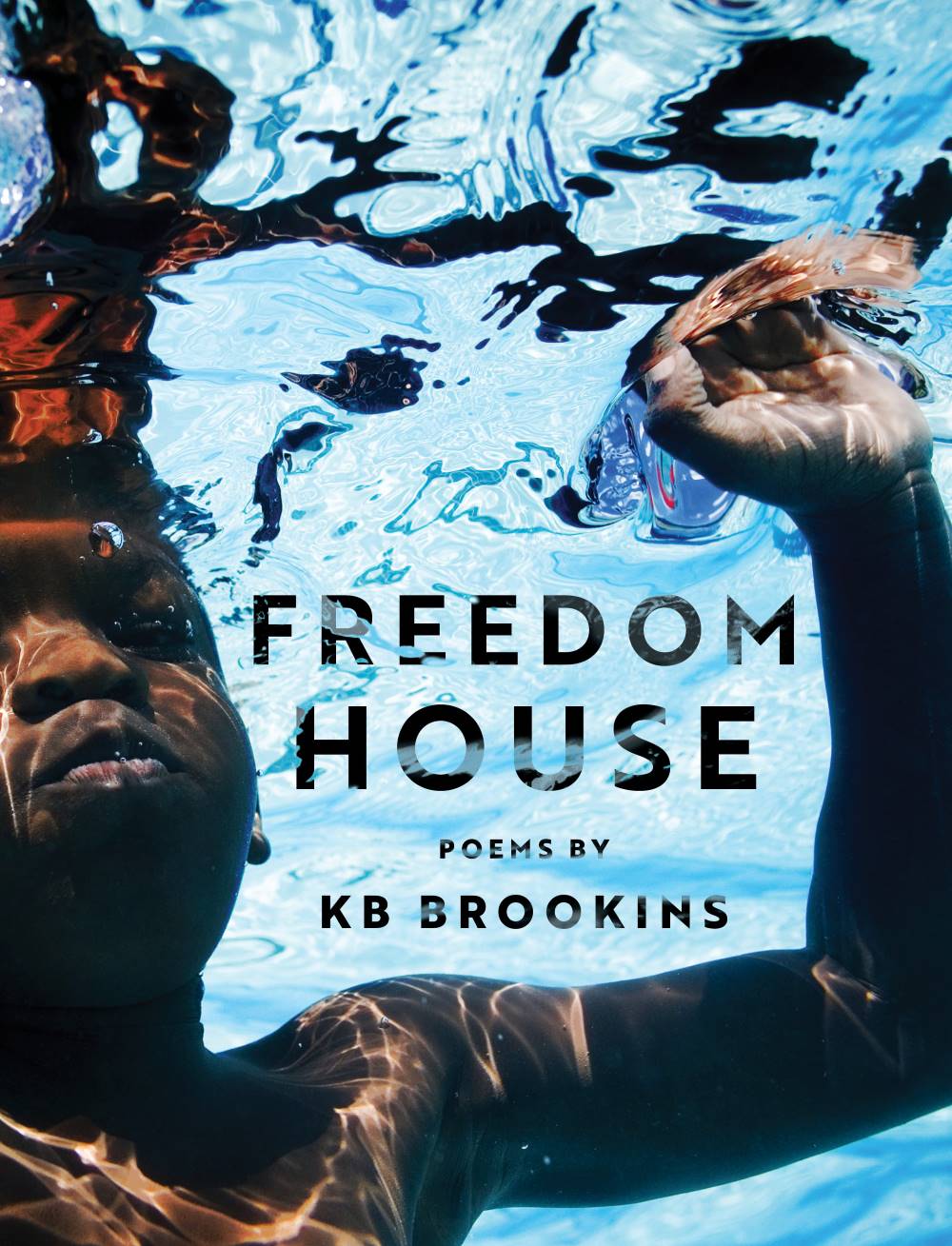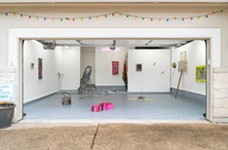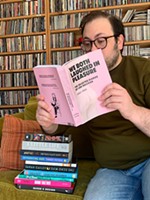Taking a Tour of Freedom House
Poet KB Brookins talks their new full-length book Freedom House
By James Scott, 9:30AM, Sat. Dec. 17, 2022
KB Brookins, author of Saguaro Poetry Prize winning How to Identify Yourself With a Wound, has been building a new space for their poetry. Through lessons and tools learned in their work as a prolific writer and workshop facilitator, and as a queer Black trans Texan, Brookins has built Freedom House, a full-length book of poetry.
Preorders for Freedom House are open, and available for purchase on multiple platforms including local booksellers like BookWoman and Black Pearl Books. Ahead of Freedom House’s April 2023 release date, I caught up with Brookins about their new work.
This interview has been edited for clarity and length
Austin Chronicle: How did the writing of this new full length book Freedom House differ from the collecting and writing of How to Identify Yourself With a Wound?
KB Brookins: So How to Identify Yourself With a Wound, it's considered a chapbook, right? Smaller book of poems, 30 pages of poems, specifically. That was a process that I think was culminated over a number of years. But I didn't really know it was a book for a long time. I was just writing poems, you know, first as a hobby. I didn't consider myself a quote unquote poet in the professional sense, probably until, like, 2018. Right. Around that time, then I was like, oh, okay, I can, you know, do the whole book thing, started, you know, putting together poems that I thought we're talking to each other. And really, it was a iterative, on and off, starting and stopping process from 2018 to 2021.
When I moved to Kallisto Gaia Press, [How to Identify] was at it's more finished state, [and they] ended up accepting it and having it win their Saguaro Poetry Prize contest. But it was a lot of starting and stopping because I had to gain confidence in myself as a writer, and really figure out what it meant to be a poet, like, what it meant to me to be a poet, what themes I wanted to talk about … first book has a lot of kind of pressure, because it's like your first debut to the world in a lot of ways. I had poems out there, obviously, before that book came out, but I hadn't had any culminated into one bound book that a press believed in enough to invest resources to. So yeah, that was a very long process, really, because I had to get over a lot of, I guess, impostor syndrome, and had to also figure out what are my themes? Like, what do I have to say.
With Freedom House, I think I was a bit more confident … In 2018, I did this workshop titled Freedom Houses, which was about the kind of colliding of poetry and social justice. I was just like, “Okay, what would it look like if art was an integral part of our social justice, our movement work?” I was talking to a number of people who are organizers and also writers. So it [was] just like, how do we merge these both a bit more artfully, a bit more tactically, and talking about the history of art? That is a part of social justice movements, you know, a lot of people look at the Black Arts Movement and other kinds of movements that incorporate art.
So yeah, it first was just a workshop that I was doing. Then it kind of turned into a book afterward when I was like, oh, again, like, what do I have to say and, now that I have that first book pressure off of me, maybe I feel like I have more license to say it. So a majority of Freedom House was written probably in like a month and a half. It is definitely, probably close to three times bigger than How to Identify. A lot of those themes that are covered like abortion, climate change, growing up black and queer in Texas, transitioning, those kinds of things that I cover in Freedom House. They had already been at the forefront of my mind; I had already written about them before. So I felt a lot more confident to just trust my instincts with this book. Probably 75% of it was [written] just like over a month and a half, and then other poems were either poems I wrote after that March to June 2021-ish period, or before like poems that I wrote years ago, dating back to something like 2018 and then like added kind of retroactively.
AC: I'm curious with the title Freedom House and having read a few interviews from you before, where you sort of talk about that the house is metaphor in how you're approaching it, can you tell me a little bit about the decision to title it Freedom House and what that means to you?
KB: I wanted to have a kind of three prong project. The book is talking about systemic freedom, as well as internal and interpersonal freedom. Really, my first big guiding question is, how do I mesh all three of these together? Oh, well, I said “freedom house” in this workshop and this seems to really resonate with participants. So why don't I use the metaphor of the house, like a living room, a bedroom? The chapters in [Freedom House] are named after different kinds of areas in a house, and what happens in a bedroom versus a kitchen versus a living room versus a foyer, like, when you start to enter a room versus when you are in a more intimate bedroom type space. Then that served as a guiding posts for the poems.
Because I already was writing a lot about transition, specifically starting the process of medical transition through the pandemic, and I was also writing a lot about family, and the hard process of coming out to family or your family seeing you in a specific way and the hardness of trying to get them to see you in a different way, which is your way, which is the way that you kind of have always been. I thought a house was just the most all-encompassing for that. I think about my house growing up, like the kitchen was where all of the kind of big debates happened, right? Like, political debates, so like, if I have poems that are doing this, it makes sense to put them in this [kitchen] section. … So really the house structure served as a guidepost for the themes that I was exploring throughout the collection, because I thought of each of the rooms as places where I could play, if that makes sense.
AC: It makes total sense. I'm interested in, you said, it's talking about freedom, both in the sense of like, systematic freedoms, and personal and interpersonal freedom. And I think that's an interesting concept to look at, especially in terms of transness.
KB: I think, at least for me, when I define freedom for myself, and like, what does freedom mean to me as a person, I mean, transness has gotten me at least close to that. Even if the world is kind of topsy turvy upside down, at least I have the personal freedom to be myself, and to change my expression and to change different things about me in order to stay more closely to how I see myself. I definitely think of transness as a freeing thing and also freeing my mind of previously conceived notions of gender I think has been a process that I've been trying to document through this book and trying to document online in different ways. And I hope that when people read those sections of the book, they really understand transness. I mean, the rhetoric around transit is really bad right now, but transness is not some, I don't know, what people are saying, like cult or something. It's like, people are just trying to exist in ways that keep their mental space safe. And we'd like you to see us as we see ourselves, right? I hope it really resonates with trans people who feel the same way and anybody else that reads the book as well, cis folks like just have a bit more of a glare into the trans experience.
AC: Have you felt like your approach in writing about subjects like transness, and anti-Blackness, has your approach to talking about those topic differed from the chapbook to this longer, more metaphor based book?
KB: I don't know that they differed, necessarily. I think I've gotten much more brave with saying maybe potentially objectionable things meaning like, in Freedom House, I feel like I say, like, cops are killing us. And also like, hey, you know, being anti-trans doesn't make any fucking sense. I just straight up more things. And I also think that, between the time that I wrote the chap book, and the time that I wrote Freedom House, I grew a lot as a poet. So I learned a bit more about the history of poetry, the conventions of poetry, what is possible with poetry form, and rhythm. I'm a very, I would say, rhythm based poet. So I feel like this Freedom House is an example of how I've grown as a writer, because I'm talking about similar themes as the chapbook. But I think this book is a bit more mature, like, shows a maturity for me as a writer, not at all bad to my chapbook, but literally the goal is as you grow as a person, you would ideally also be growing in your craft as a writer. I've read a lot since then. I've even like learned more about myself since then. A lot of with the chapbook, I was only just beginning the steps of transition. I've just learned more things about myself, learned more things about how people perceive me differently now, all of those kinds of things. So I think there is a growth.
AC: Is there anything else that not covered by the questions that you want folks to know or that you want to talk about?
KB: I want to do a pitch for why to buy this book. So, I think people should buy this book because, I mean, it's my life's work, obviously. But outside of that, if you're trying to have discussions and conversations about what it means to be trans in America, what it means to be Black in Texas, abortion, climate change: I have a poem in there about Texas Winter Storm Uri. I have poems in there about police brutality. I have poems in there about masculinity and what it means to be an ally to different non-masculine folks. I have poems in there about being a survivor, poems in there about disability, like, it's a lot of stuff. I think it's a good read for anyone that's looking to understand what freedom looks like, in America, what freedom looks like for trans people, what freedom looks like for Black people. If you also want some pick me ups, I got, you know, though these are heavy topics, I've also got some joyful poems in there. So yeah, definitely pick it up. It would mean a lot to me. Gift it to other people who may share similar identities as me and want to see themselves reflected in literature.
Freedom House is currently available for preorder through a variety of booksellers, as well as directly from publisher Deep Vellum. It will be officially released on April 11, 2023. Find updates, previous published work, and preorder links on KB’s website, earthtokb.com.
A note to readers: Bold and uncensored, The Austin Chronicle has been Austin’s independent news source for over 40 years, expressing the community’s political and environmental concerns and supporting its active cultural scene. Now more than ever, we need your support to continue supplying Austin with independent, free press. If real news is important to you, please consider making a donation of $5, $10 or whatever you can afford, to help keep our journalism on stands.
James Scott, Jan. 14, 2023
James Scott, Jan. 13, 2023
Jan. 13, 2023
Jan. 6, 2023
LGBTQ, KB Brookins, Freedom House, How to Identify Yourself With a Wound










